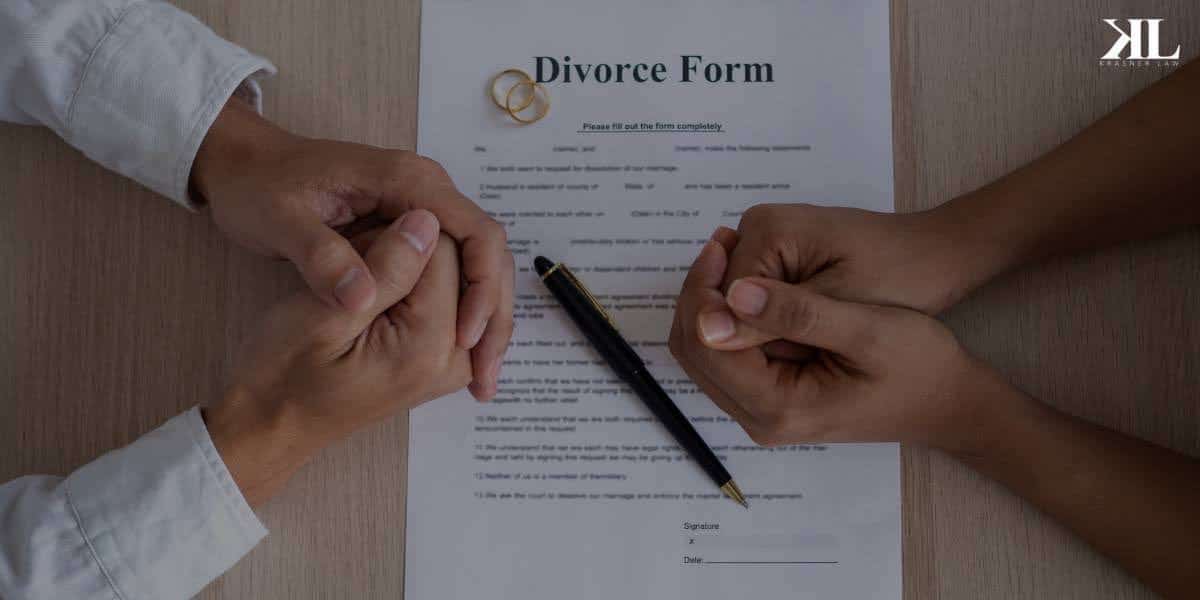Getting served with divorce papers can be a bit overwhelming, and one of the first questions you might ask yourself is, “If I am served divorce papers do I have to sign them?” The short answer is no, you don’t have to. But whether or not you sign them, there are certain things you need to be aware of. Signing the papers can mean different things, and it’s important to know your legal options before making a decision.
What Happens After Divorce Papers Are Served in NY?
When you’re served with divorce papers in New York, it’s a signal that the divorce process has officially begun. These papers usually include a summons and a complaint. The summons is basically a notice that you’re being sued for divorce, and the complaint lays out what your spouse is asking for—things like how to split up property, custody of kids, and spousal support.
Once you receive these papers, you have 20 days to respond if you were served within New York, or 30 days if you were served outside of the state. If you don’t respond within that time frame, the court can move forward without you. This is called a default judgment, and it can give your spouse everything they’re asking for without hearing your side.
Signing the papers doesn’t mean you’re agreeing to all of your spouse’s demands. It just means you’ve received the papers and that you’re participating in the process. If you’re not sure what to do next, it’s a good idea to speak with a divorce lawyer, like those at Krasner Law, to help guide you through your options.
If I Am Served Divorce Papers Do I Have to Sign Them?
If you’ve been served divorce papers, you might be wondering, “Do I have to sign these?” The answer is no—you don’t have to sign them, but there are several important things to consider before making a decision. Whether or not you sign the papers, it’s crucial to understand what your options are and what happens next. Let’s break it down step by step.
Your Main Options
When served with divorce papers, you have several choices for how to proceed. Each option comes with its own set of pros and cons, so it’s important to think carefully about what works best for your situation.
1. Sign and Respond
If you choose to sign the divorce papers, you’re not necessarily agreeing to the terms of the divorce. Signing simply acknowledges that you’ve received the documents and that you’re ready to participate in the process. Once you sign, you’ll have the chance to respond and explain your side.
-
Pros: By signing, you show that you’re willing to be involved in the process, and you maintain the right to negotiate or contest any terms in the divorce.
-
Cons: There are no significant downsides to signing as long as you respond in time and are prepared to address the terms you disagree with.
In your response, you can:
-
Agree to some or all of the terms
-
Negotiate different terms (like custody or property division)
-
Completely challenge what’s being asked
2. Refuse to Sign
You can refuse to sign the divorce papers, but that doesn’t mean the divorce process will stop. In fact, refusing to sign can complicate things. Your spouse can still move forward with the divorce, and the court may grant a default judgment, which often favors the spouse who filed.
-
Pros: Some people believe refusing to sign might delay the process, but in reality, it rarely helps. The divorce will move forward whether you sign or not.
-
Cons: Refusing to sign means the court may make decisions about things like child custody, spousal support, and property division without considering your input. You risk losing control over important aspects of your life.
3. Negotiate
After being served with divorce papers, you have the option to negotiate with your spouse. This is often the best route if you and your spouse want to come to an agreement without going through a long, drawn-out court battle. Negotiation can cover key issues such as:
-
Child Custody: Who gets primary custody, and how will visitation work?
-
Asset Division: How will you and your spouse split up property and other assets?
-
Spousal Support: Will one spouse need to pay alimony? If so, how much and for how long?
Having a lawyer by your side, like the team at Krasner Law, ensures that your rights and interests are protected during negotiations. They can help guide the conversation and make sure you get a fair deal.
4. File a Counterclaim
In addition to responding to the divorce papers, you have the option to file a counterclaim. A counterclaim allows you to lay out your own terms for the divorce. This can be helpful if you want to request different terms than what your spouse has proposed.
For example:
-
If your spouse is asking for full custody of your children, you could counterclaim and request joint custody.
-
If you believe the division of property is unfair, you can counterclaim to propose a different arrangement.
Filing a counterclaim allows both sides to present their case to the court, and the judge will consider both perspectives when making a decision.
What Happens If You Don’t Sign?
Some people think that by refusing to sign the divorce papers, they can stop the divorce from happening. Unfortunately, this isn’t true. The divorce process will continue whether you sign or not. In fact, refusing to sign can actually put you in a worse position.
If you don’t sign the papers or respond within the required timeframe (20 days if you’re served within New York, 30 days if you’re served outside the state), the court can issue a default judgment. A default judgment means the court will make decisions based on your spouse’s requests, without taking your input into consideration.
Here’s what can happen if you don’t respond:
-
Child Custody: The court could grant your spouse the custody arrangement they’ve asked for, which might not be in your best interest.
-
Asset Division: The court may divide your property and assets in a way that benefits your spouse more than you.
-
Spousal Support (Alimony): Your spouse could be awarded alimony based only on their claims, without the court hearing your side of the story.
In short, refusing to sign the papers can leave you with little say in how things like child custody, property, and finances are handled.
Can You Challenge the Divorce Even If You Don’t Sign?
Yes, you can still challenge the terms of the divorce even if you don’t sign the papers right away. However, there’s a catch—you need to respond within the deadline. If you miss the deadline, it becomes much more difficult to contest the divorce because the court will proceed without your involvement.
That’s why signing the papers (or at least acknowledging them) is often the smarter move. By signing, you keep yourself in the loop and make sure your voice is heard throughout the process. Here’s why it’s better to stay involved:
-
You can negotiate terms: If you sign and respond, you’re giving yourself the chance to negotiate a better outcome.
-
You avoid a default judgment: A default judgment could give your spouse everything they’re asking for, which might not be fair to you.
-
You stay in control: Signing the papers doesn’t mean you agree to everything. It just means you’re willing to participate and protect your interests.
Key Takeaways:
-
You don’t have to sign divorce papers, but refusing to sign won’t stop the divorce process.
-
Signing doesn’t mean agreeing; it just means you’re acknowledging receipt and staying involved in the process.
-
If you refuse to sign, the court may issue a default judgment, which could result in decisions being made without your input.
-
You can negotiate with your spouse on key issues like child custody, asset division, and alimony.
-
Filing a counterclaim allows you to propose your own terms for the divorce, which the court will consider.
-
Always respond within the deadline to avoid losing control over important decisions.
If you’ve been served divorce papers and are unsure about what to do, remember that you don’t have to sign them, but it’s usually in your best interest to acknowledge and respond. Signing gives you a chance to participate in the process, negotiate terms, and avoid an unfavorable default judgment. If you’re feeling uncertain or need guidance, the experienced team at Krasner Law can help you navigate the legal process and protect your rights.
What Are Your Options After Being Served Divorce Papers?
When you’re served with divorce papers, it can feel overwhelming, but you have several legal options. It’s important to take action within the required timeframe to protect your rights and have a say in how your divorce is handled. Here’s a breakdown of your options:
1. File a Response
The first and most crucial step is filing a response to the divorce papers. Even if you don’t agree with the terms outlined by your spouse, filing a response allows you to stay involved in the process.
-
What does filing a response mean? Filing a response is your opportunity to agree or disagree with what your spouse has asked for in the divorce papers. You can challenge things like how to divide assets, custody of children, or whether you should pay or receive spousal support.
-
Why is this important? If you don’t respond within the given time (20 days in New York), the court may grant your spouse everything they requested without considering your input. This is called a default judgment, and it could result in an outcome that’s not in your favor.
-
How do I file a response? You’ll need to submit an official answer to the court, either agreeing with or contesting the terms of the divorce. Working with an attorney like those at Krasner Law can help ensure your response is properly filed and reflects your best interests.
2. Seek Mediation
If you and your spouse are both willing to communicate and compromise, mediation might be a good option. This involves working with a neutral third party, known as a mediator, who helps you reach an agreement on contested issues.
-
What is mediation? Mediation is a process where a trained mediator helps you and your spouse discuss and agree on important matters like property division, child custody, and spousal support. The mediator does not make decisions for you but helps guide the conversation.
-
Why consider mediation? Mediation can be faster, less stressful, and less expensive than going to court. It also allows both parties to have more control over the outcome, as you work together to make decisions rather than having a judge decide for you.
-
What happens if we can’t agree in mediation? If mediation doesn’t lead to a resolution, you can still move forward with a trial, but at least you’ve made an effort to settle things peacefully.
3. Go to Trial
If you and your spouse can’t agree on key issues, your case will go to trial, where a judge will make the final decisions. This can be a longer, more expensive option, but sometimes it’s necessary when agreements can’t be reached.
-
What happens at a divorce trial? During a trial, both you and your spouse will present evidence and arguments in front of a judge. The judge will then make decisions about all aspects of the divorce, such as child custody, property division, and spousal support.
-
How long does a divorce trial take? Divorce trials can take months or even years, depending on how complex the issues are and how busy the court system is. A trial can also be emotionally draining, as it involves airing personal matters in court.
-
Is going to trial always necessary? No. Going to trial is usually the last resort. Most divorce cases are settled through negotiation or mediation, but if those options don’t work, a trial is the next step.
4. Collaborative Divorce
Another option for couples who want to avoid the stress of court is collaborative divorce. This process allows both spouses to work together with their attorneys to come to an agreement without the need for a trial.
-
What is a collaborative divorce? In a collaborative divorce, both spouses agree to work out the terms of the divorce with their attorneys outside of court. Everyone signs an agreement to cooperate and communicate openly to reach a settlement.
-
What are the benefits of a collaborative divorce?
-
It’s less adversarial than going to court, which can reduce conflict and stress.
-
It can be quicker and less expensive than a full-blown trial.
-
Both parties have more control over the outcome.
-
-
What happens if we can’t agree? If the collaborative process breaks down and you can’t come to an agreement, you may still need to go to trial. However, in collaborative divorce, both attorneys typically withdraw from the case if it goes to court, meaning you’ll need new legal representation.
What Happens After Divorce Papers Are Served in NY?
Once divorce papers are served in New York, the clock starts ticking for your response. You have 20 days if you were served within the state and 30 days if served outside of New York. It’s essential to act quickly to ensure your voice is heard in the process. Here’s what to expect:
-
Negotiate or Contest: After being served, you have the option to either negotiate the terms with your spouse or formally contest them by filing a response.
-
Default Judgment Risk: If you do nothing and don’t respond, the court may issue a default judgment, meaning your spouse could get everything they’ve requested in the divorce papers.
-
Get Legal Help: Whether you choose to negotiate, file a response, or contest the divorce, consulting with an experienced family law attorney is critical. Krasner Law can guide you through the process and help protect your rights.
Frequently Asked Questions
-
Do I have to sign the divorce papers? No, you don’t have to sign the papers. Signing only acknowledges that you received them, not that you agree with the terms. However, refusing to sign doesn’t stop the divorce from proceeding.
-
What happens if I don’t respond? If you don’t respond within the required time, the court can issue a default judgment in favor of your spouse. This could lead to an outcome that’s not in your best interest, so it’s essential to respond promptly.
-
Can I change the terms of the divorce after being served? Yes, you can challenge or negotiate the terms after being served by filing a response and working through either mediation or collaborative divorce. You can also present your case in court if it goes to trial.
-
How long does it take for a divorce to be finalized in New York? It depends on several factors, such as whether the divorce is contested or uncontested and how busy the courts are. An uncontested divorce can take a few months, while a contested divorce might take over a year.
Being served divorce papers can feel intimidating, but you have several options to protect your rights. Whether you decide to file a response, seek mediation, or go to trial, it’s important to stay involved in the process to ensure your voice is heard. If you’re unsure of what to do next, consulting with an attorney from Krasner Law can help you understand your legal options and guide you through every step of the way.
Conclusion
So, “If I am served divorce papers do I have to sign them?” No, you don’t have to, but it’s important to understand what could happen if you don’t. Signing the papers allows you to participate in the divorce process and have your voice heard. Refusing to sign could result in a default judgment, which may not work in your favor.
If you’re unsure about what to do after being served divorce papers, it’s best to consult with a family law attorney. The team at Krasner Law is here to help guide you through the process and make sure your rights are protected. Contact Krasner Law today for more information and personalized legal support.









